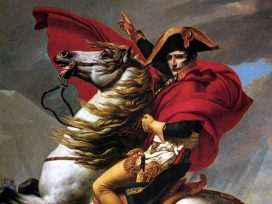Is fascism making a comeback?
As a historian, my first reaction has been to answer the question with a resounding ‘no’. My professional training has led me to think of fascism as a specific historical phenomenon, largely limited to the period from the early 1920s to the end of World War II, and built around highly regimented mass movements. These movements struggled to bring about the revolutionary transformation of society, worshipped omnipotent leaders, had a mystical belief in the power of violence, and were committed to a racialized cult of the nation grounded in fantasies about a mythical past. Fascist movements also included powerful paramilitary auxiliaries such as the Nazi SA and Mussolini’s Black Shirts. In the fascist states, the movements took control of the government and transformed it into an instrument for achieving their repressive, and even genocidal, aims.
By this specific historical definition, it is hard to see fascism at work in the world today, and certainly not in the United States. The Republican Party, whatever its flaws, is not a regimented mass movement, with dedicated cadres under party discipline. America’s fringe right-wing militias are not latter-day Black Shirts. Neither are the few hundred border control agents whom the administration sent into Portland and other U.S. cities this summer.
Many commentators have recently argued, with some justice, that this historian’s definition is too restrictive. If a politician’s rhetoric, attitudes, ideas, and tactics echo those of earlier, self-proclaimed fascists — perhaps with sly, dog-whistle intentionality — must we really resist saying so? Is the word never appropriate in the absence of a full-fledged fascist movement akin to Mussolini’s or Hitler’s?
Authors such as Jason Stanley (How Fascism Works) and Federico Finchelstein (From Fascism to Populism in History and A Brief History of Fascist Lies) make a strong case for not keeping the political f-word off-limits in political discussion.
Even so, warnings about fascism can still all too easily blind us to the nature of the political dangers we are now facing. Politicians and parties may ‘perform’ fascism, as Stanley puts it, and include elements of it in their programs, without having either the desire or the ability to create anything like the fascist regimes of the past. But the word carries such intense associations, and provokes such intense emotions, that this key distinction gets blurred, leaving us without any real sense of what the ‘fascists’ we are criticizing actually want, or have the ability, to achieve.
When democracies fail, they do so in many ways, and most of these ways do not lead to full-fledged fascism. (It’s worth remembering that most of the European states in which democracy collapsed during the interwar period, including Poland and the Baltic states, did not become fascist.)
Among influential figures on the American right today, some dream of a Protestant theocracy, others of an ‘integralist’ state grounded in reactionary Catholic traditions that trace their origins all the way back to the early nineteenth-century high priest of reaction, Joseph de Maistre. Populism has many variants, some of which have close links to fascism (as Finchelstein emphasizes), and some of which do not. As for many congressional Republicans, their vision for American society looks far more like a capitalist oligarchy dominated by the ultra-wealthy than anything that existed in fascist Europe between the wars.
History also offers many different examples of authoritarian, one-person rule, most of which were not fascist either. Many of these – hereditary, divine-right monarchies, for instance – are not likely to find many adherents in the early twenty-first century.
But one variety of authoritarianism has historically proved far more popular than fascism, and remains quite relevant in the present day. This is what nineteenth-century writers called Caesarism: a system in which an authoritarian ruler claims to derive legitimacy from the popular will and to serve as a focus of national unity.
Caesarists past
Unlike self-described fascists, who often voiced extreme contempt for democracy, ‘Caesarists’ generally described their ideal regime as the truest form of democracy, which is why self-described democrats have often been easily seduced by it. Today, at least several prominent regimes can be described as Caesarist and offer an attractive model to aspiring authoritarians elsewhere – including, perhaps, in the United States.
To understand Caesarism, the best place to start is with Napoleon Bonaparte. Although the word ‘Caesarism’ itself only dates from the second half of the nineteenth century, the writers who coined it generally saw Napoleon as its greatest exemplar. And indeed, Bonaparte actively invented Caesarism’s most important elements, while wrestling with the legacy of French revolutionary democracy.
When the French Revolution began in 1789, the 20-year-old Napoleon supported it enthusiastically. He admired Maximilien Robespierre and owed much of his initial rise to Robespierre’s brother. As an ambitious and successful young general after the Terror, even while promoting himself as a charismatic savior figure, he remained on the left side of France’s tumultuous political arena.
When he seized power in 1799, Napoleon claimed to have done so in order to save the Republic. Like the Jacobins, he submitted his new constitution, which granted him sweeping powers, to the French people for their approval. Even if the new interior minister – his brother Lucien – cheated to make the results look quasi-unanimous, Napoleon’s constitution had the support of a genuine majority of French voters.
Even when Napoleon took an imperial crown five years later, in imitation of the Roman Caesars, he did not fully break with the republican past. He called himself ‘Emperor of the French’ rather than ‘Emperor of France’, and the official act implementing the decision stated: ‘The government of the Republic is confided to an Emperor’.
Napoleon’s propagandists strenuously attempted to reconcile this nominal republicanism with autocratic rule – and in doing so, sketched out a striking vision of political authority.
In a high-profile eulogy for George Washington, delivered in Napoleon’s presence at the Invalides in 1800 and transparently designed to cast the Corsican as Washington’s spiritual heir, Louis de Fontanes argued that when a country had suffered a great political crisis, it needed ‘an extraordinary personality to come to the fore who, thanks to his glory alone … imposes order in the midst of confusion’. Fontanes further asserted that in the early history of republics, customs and morals mattered more than the letter of the law (which Bonaparte’s coup had rather spectacularly violated) and that rulers should ‘govern more by sentiments and affections than by orders and laws’.
In subsequent writings, Fontanes and others asserted that holding together a fractious, divided state demanded an extraordinary, dominant personality capable of forging an intimate, emotional bond with the citizenry. In Napoleon’s case, this bond was most powerfully formed in moments of popular rejoicing over his military victories.
Despite his imperial pretensions, Napoleon never succeeded in transforming his personal charisma into durable imperial institutions. When, in 1812, conspirators spread the false rumour that he had died in the Russian snows, deceived officials debated what sort of provisional government to establish in his place. Not for a moment did any of them consider proclaiming his infant son the new emperor.
In exile, Napoleon himself observed that ‘the State was me … I was, myself, the keystone of a new edifice built on such fragile foundations! Its survival depended on each one of my battles.’ In his spectacular, doomed attempt to return to power in the ‘Hundred Days’ of 1815, he once again sought support by posing as the democratic choice of the people and by liberalizing the constitution.
In the nineteenth century, Napoleon’s autocratic rule, costly wars, and ultimate defeat made him a distinctly problematic political model. Europe’s greatest writers viewed him with a combination of awe and horror, as in Nietzsche’s memorably concise description of him as ‘this synthesis of Unmensch and Übermensch’.
The later charismatic leader who most closely resembled him, Simón Bolívar, repeatedly denied the similarity. In 1825, one of Bolívar’s subordinates compared South America to France in the late 1790s, and urged his leader to stage an Eighteenth Brumaire-style coup: ‘You are now in a position to say,’ he wrote, ‘what [Napoleon] said at the time: the intriguers are going to ruin the country. Let us go and save it … General, this is not the land of Washington. Here people bow down to power out of terror and self-interest.’ Bolívar responded angrily: ‘Colombia is not France and I am not Napoleon … Napoleon was great and unique, and besides, exceedingly ambitious. Here things are very different. I am not Napoleon and do not want to be. Neither do I want to imitate Caesar.’
Yet despite Bolívar’s disclaimer, the vision of political authority that he developed in the 1820s came strikingly close to the one propounded by Napoleon and his propagandists. As Bolívar strove to unite much of South America into a single country, he too argued for the necessity of a single, dominant political leader who would enjoy sweeping executive powers, chosen by ‘acclamation’ and bound to the people by powerful emotional ties generated in large part through military victories. Only such a leader, Bolívar insisted, could hold together a country deeply divided by race and extremes of wealth. And despite his protestations to his subordinate, Bolívar had a lifelong fascination with Bonaparte, whose coronation he had personally witnessed in Paris in 1804. In 1828, he confided to a French aide that the ‘general effusion of every heart’ manifested on that occasion ‘by more than a million individuals, seemed to me … the ultimate ambition of man’. If Napoleon was the first great Caesarist of the modern period, Bolívar was the second.
Many others would follow these men’s examples, including, most prominently, Napoleon’s own nephew Louis-Napoleon. In an 1839 volume entitled Napoleonic Ideas, the younger Bonaparte offered his own concise summary of Caesarism: ‘The nature of democracy is to personify itself in a man.’ In 1851, he staged a coup against France’s Second Republic, and soon afterwards proclaimed himself Emperor Napoleon III. He repeatedly tried to reproduce, with a striking lack of success, his uncle’s military glory. It was one of his supporters, Auguste Romieu, who first popularized the term ‘Caesarism’. In the twentieth and twenty-first centuries as well, many authoritarian, militaristic rulers have reasserted the Napoleonic credo, claiming to serve as a necessary focal point of national unity, claiming to have a direct, emotional bond with the people, and demonstrating this bond through plebiscites, rallies, and other instances of political theater.
Caesarists present and future
Along the way, Caesarism has also attracted considerable intellectual support, most prominently from the great German social theorist Max Weber.
In the last years of his life, after Germany’s defeat in World War I and the chaotic birth of the Weimar Republic, Weber agonized about the dangers of ‘headless democracy’. He stressed the importance of charisma – a concept he himself largely invented – as a fundamental form of political authority, especially during the foundation of states. In a famous exchange with General Erich Ludendorff, Weber dismissed Weimar as a Schweinerei (a horrible mess) rather than a true democracy. ‘In a democracy,’ he continued, ‘the people choose their leader, whom they trust. Then the chosen man says, “Now, shut up and get on with things.” The people and the parties may no longer interfere with him.’ Ludendorff quipped that he could like such a democracy, but Weber added: ‘Later the people can sit in judgment. And if the leader has made mistakes – to the gallows with him!’
It isn’t hard to find contemporary autocrats who fit the Ceasarist mold: Turkey’s Recep Tayyip Erdoğan is one, and Hungary’s Viktor Orbán is another. But the most prominent of them all is Russia’s Vladimir Putin.
Like Napoleon, Putin preserves the forms of democracy, regularly running for election and submitting constitutional changes (including the recent one that will allow him to remain president into his eighties) to national plebiscites. He too claims that he serves as a necessary focal point of national unity, in a country too fractious – and left too divided by the collapse of the Soviet Union – to do without it. He too wants national political life to turn tightly around his own charismatic personality, and he makes a show of cultivating relations with individual Russians, notably in annual televised shows in which he sits for hours taking calls from carefully-screened ‘ordinary citizens’. Putin, like his Caesarist predecessors, has built his rule in part on military victory: over Chechnya in 2000, over Georgia in 2008, and in the seizing of Crimea from Ukraine in 2014.
Donald Trump clearly admires Putin, whom he has repeatedly praised, defended, and tried to bring back to the G-7. According to former CIA director Michael Hayden, ‘there is a bit of autocrat envy in terms of the president’s attitude toward the President of the Russian Federation’. Trump shares Putin’s disdain for restraints on executive power and craves the same sort of direct, unmediated connection with the population. The decision by the Republican National Convention this week to dispense with a party platform and simply to support whatever Trump wants is a Caesarist move. The decision to have half the lead speakers at the Republican Convention come from Trump’s own family recalls the way Napoleon Bonaparte made his extended empire into a family business staffed in large part by his brothers and sisters.
Still, Trump also differs from Putin and historical Caesarists in several respects. He has no military victories to his credit, even if he claims to have won several trade wars, and routinely treats foreign countries (especially allies) with bumptious hostility. While he offers boilerplate praise for democracy, he rarely presents himself as the people’s servant (he can’t bear, after all, to see himself in a subordinate position). Most significantly, the hyper-partisan Trump barely even gestures towards the idea of national unity. He did do so during the 2016 presidential campaign, when he seemed to challenge the mainstream of his party over foreign military action and also over cutting federal spending. (Remember ‘infrastructure week’?) But in office, he has shown nothing but disdain for his political opponents and their supporters.
But we would be very short-sighted indeed if we saw Donald Trump as the only potential authoritarian on the horizon. Nor should we assume that subsequent dangers of the sort will necessarily emerge from the same hyper-partisan Republican party that produced Trump.
It is also possible that, as the country pitches further and further into vicious partisan conflict and political paralysis, the greater the opening will be for a true Caesarist figure who claims to stand above and beyond the parties, and to provide a source of national unity. The same social media that has so effectively contributed to the current partisan divide could easily be exploited by a charismatic, supposedly non-partisan politician to build a powerful base of popular support.
If such a person came to the presidency with support from across the political spectrum, he or she could quite possibly abuse executive power to a far greater extent than even Donald Trump has dreamed of, in the name of quelling the extremes and bringing the country together.
Such an outcome may seem unlikely in this moment of such horrendous partisan divisions and hatreds, and it is by no means inevitable. But consider this. In the year 1794, France was in thrall to a partisan conflict that by any measure dwarfs what we are currently living through in the United States. Civil war raged in several parts of the country, ultimately taking hundreds of thousands of lives. A radical regime was ruling through terror, executing tens of thousands of its opponents, and contributing to a cycle of violence that would continue with a White Terror and further bloody uprisings. But just five years later, an enormously charismatic military hero – who in 1794 had still been largely unknown – seized power, and did in fact manage, for a time, to unite much of the country behind him, even while establishing a repressive autocracy.
To me, the rise of a nominally democratic strongman in America in the years ahead seems no more unlikely than the rise of Napoleon Bonaparte would have seemed in the France of 1794 – or the election of Donald Trump at the beginning of the 2010s. The conditions, and precedents for it, exist. It isn’t an American fascist we have to fear – it’s an American Caesar.








